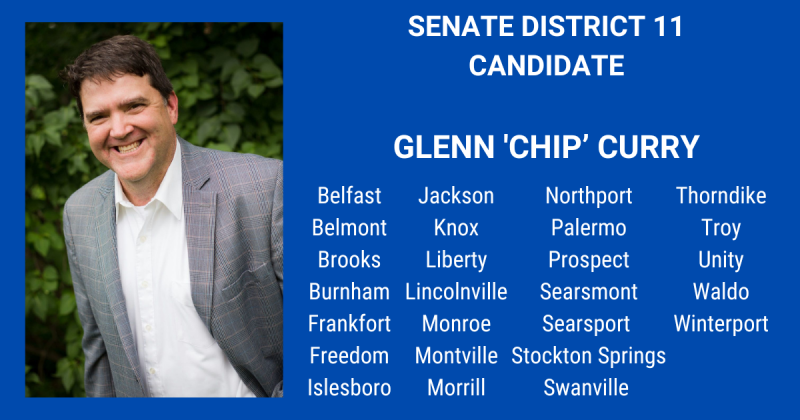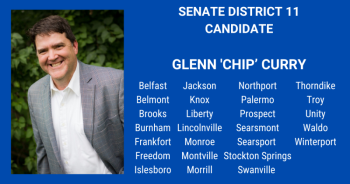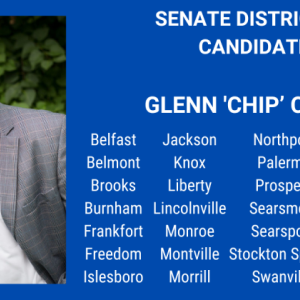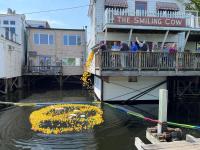On the issues: Senate District 11 candidate Glenn ‘Chip’ Curry
Penobscot Bay Pilot has posed questions to each candidate running for Maine State Legislature, providing the opportunity for the public to better understand their position on issues important to the state. Candidates responding with their individual written answers will have their responses stored in the Pilot’s 2022 Election Resource Guide.
Glenn ‘Chip’ Curry, a member of the Democratic party, is seeking election to represent Maine Senate District 11, which includes Belfast, Belmont, Brooks, Burnham, Frankfort, Freedom, Islesboro, Jackson, Knox, Liberty, Lincolnville, Monroe, Montville, Morrill, Northport, Palermo, Prospect, Searsmont, Searsport, Stockton Springs, Swanville, Thorndike, Troy, Unity, Waldo and Winterport.
Please provide a concise biography of yourself, and state why you are running for political office.
I am a resident of Belfast and have also lived in Knox and Unity. My wife, Christi Goosman, has taught at Searsport District High School for over 25 years, and my daughter is a student of RSU 71. I have worked most of my adult life helping people overcome challenges and achieve their goals. During the 1990s at Unity College, I taught students outdoor leadership, environmental stewardship, and civic engagement.
For over 10 years I worked with the Governor’s Children’s Cabinet where I led an initiative to strengthen community-based efforts to reduce child poverty and protect children from abuse and neglect. For much of the last decade I have helped adult students returning to college; helping them to develop the skills and earn the credentials they need to find good paying jobs.
In the legislature I serve as the Senate Chair for the joint standing committee on Innovation Development Economic Advancement and Business and I also am a member of the joint standing committee for Inland Fisheries and Wildlife. I serve on the Maine Fire Commission and serve as the Senate Chair for the Blue Ribbon Commission on to Study Maine Emergency Services. Locally I serve on the board of Waldo Community Action Partners and volunteer building sets for Searsport District High School’s theater.
What are the three most pressing issues facing Maine, as a state, today, and how would you like to see them resolved?
Three issues that immediately come to mind are housing costs, access to child care, and home heating costs. All three of these barriers directly challenge people struggling to make a good life here in Maine. With our communities and environment, the quality of life here in Waldo county is very high, but people have to be able to afford to live here.
Our housing crisis is at least 12 years in the making and no one thing is going to fix it. We lost so many trades people during the great recession and we never replaced them. We must continue to encourage our youth to enter the trades and we must invest in our Career and Tech Ed. Centers so that we are educating our kids using the current tools and equipment. We are in dire need of more senior housing and workforce housing. I support investing in both.
Our child care system is broken. We have always relied on paying women less than a livable wage to care for our children. The scarcity of child care providers now is the natural result. Yet most young families simply cannot afford to pay the rates that would be required. We cannot lament our birth rate, which is below replacement levels, at the same time we make it financially impossible for people to start families. Likewise we must understand that a significant number of parents and grandparents have not returned to the workforce because of a lack of affordable accessible childcare. Early child development sets the stage for healthy kids and adults. Investing in our child care system and the workers delivering the care and education will result in long term gains for children, families and all of the people of Maine.
Maine is the most oil dependent state in the U.S. when it comes to heating our homes. With 60% of our homes relying on oil, we are at significant risk to international price shocks like we have seen this year. Yet the pain is not evenly felt. Those who have the resources to invest in heat pumps and far more efficient renewable systems can save significant money over time. Our challenge is to shepherd Maine to transition onto more reliable, affordable, and sustainable home heating and energy usage.
Maine is grappling with a housing shortage, and legislation has been crafted — and passed last year — at the Maine Legislature to try and ease the situation by allowing greater density in all municipalities. Those municipalities now are analyzing this new state rule to understand how it applies to local zoning ordinances. Do you think this was an appropriate law to pass?
Yes, there is no one solution to our housing crisis. The legislation passed this past year seeks to work with local zoning ordinances and empower Maine people to become part of the solution. As this law rolls out and is operationalized we may find clarifications and adjustments are needed. I am open to that but am committed to addressing the significant housing issue we face here in Maine.
Do you have other ideas, and proposals, to help ease the housing problem?
While we build new housing of all types and repair old housing we must also face up to the fact that homelessness is real here in Waldo County and we need to strengthen our emergency shelter system.
What legislative committees would you like to serve on and why?
I would like to continue serving on the IDEA committee (Innovation Development Economic Advancement and Business). This committee is charged with considering legislation that addresses economic development as well as workforce development, two areas that are central to the health and viability of our people and communities.
I would also hope to continue serving on IFW (Inland Fisheries and Wildlife). Hunting, fishing and other wilderness pursuits are so important to the people of Waldo county. I’m honored to represent our voices on these matters in Augusta.
Maine’s economy relies on small and micro-businesses. How will you help the entrepreneur succeed in this state?
Entrepreneurship is inherently risky, but working with the state shouldn’t make it harder. We have a responsibility to be predictable and stable. No one wants to make a significant investment only to find out afterward that the rules have changed. In areas of permitting, the State has a duty to the people to be thorough but likewise must be staffed sufficiently enough to be speedy for the business.
One of the biggest disadvantages for small businesses in attracting employees is their ability to offer affordable health insurance. In Maine we must continue to increase accessibility to affordable health insurance, doing so increases people’s work choices and strengthens small businesses.
What are the greatest economic, cultural and social strengths in your district, and how will you support them?
In Waldo County we have 26 small communities. Each of these communities has a legacy of coming together to take care of each other and their common needs. What we have today; the fire departments, schools, ambulance services, churches, civic clubs, parks, seniors groups, etc. exist today because people before us stepped up to create them and support them. We have a legacy of people serving and sacrificing to make things better for everyone. And people continue to step up to serve. As Senator I view my job is to listen to these community leaders, connect them to resources that can help them, and work with them to achieve their goals.
What are the greatest problems in your district, and how do you intend to address them?
Affordability continues to be the greatest problem. For far too many people wages cannot cover the basic necessities of life. I intend to continue to work to attract and support businesses that provide livable wages to their employees, strengthen our housing supply so as to reduce rents, and increase access to affordable health care. In addition I will continue to promote increased access to Broadband to allow for more remote work and more accessible telemedicine.
Do you support construction of the 145-mile Central Maine Power transmission line from Quebec to Massachusetts?
No. I am not in support of the project.
The Maine Commission on Indigent Legal Services recently received funding from lawmakers to fund five public defenders to travel the state representing indigent defendants. Its executive director says that is “not a solution, it’s a patch" and that the agency needs an estimated $51 million to open public defender offices in all 16 counties. Should the legislature be looking to fund more public defenders?
Yes, we should be looking into increased funding for public defenders. Maine is an outlier in how we fund defense lawyers. Our system of justice is based upon the assumption that defendants have adequate legal representation. When defendants receive substandard representation the system fails resulting in injustice added costs to taxpayers.
At least four county jails in Maine have combined to record nearly 1,000 phone calls between jailed defendants and their attorneys. What action would you like to see the legislature and governor take to ensure this never again happens?
No individual or entity is above the law. Accountability matters in a democracy. The matter needs to be fully investigated and actors who broke laws or policies need to be held accountable. A new system needs to be put in place where lawyers and their clients can be assured their constitutionally protected private conversations are not being recorded and used against them.
Maine is one of 16 states that does not offer parole after abolishing it in 1976. Should the state reinstate the possibility of parole?
When Maine abolished parole it also did away with indeterminate sentences. Instead of receiving 10-20 years for example a person would be given a date certain for release. In addition, Maine currently utilizes a program called secure community confinement which has similar aspects to parole. In this program the incarcerated individual lives at home in the community, can work and go to school.
I see strengths in both of these models. I am pleased there is a study commission currently underway exploring the issue. I look forward to reviewing their recommendations.
There is a statewide shortage of nurses willing to work at nursing homes and assisted living facilities. What more should the state be doing to attract workers?
We should be and are training more nurses. For nine years I’ve worked with people in the midcoast region seeking to become nurses. Early on in my career the single biggest challenge to becoming a nurse was getting a spot in a nursing education program. I know nurses that waited 4 years to get a spot. This is no longer the challenge.
With the support of added state funding and bonds since 2018 we have seen a significant increase in the capacity of nursing education programs and an increase in the number of nurses graduating from our community colleges and universities. Still we need more nurses and must continue to recruit new nurses into the profession from here as well as attracting nurses from outside of Maine.
What is your position on abortion?
I believe reproductive health care including contraception and abortion is health care. These health care decisions are deeply personal and should not be interfered with by politicians, prosecutors, judges or law enforcement.
The Maine Dept. of Transportation is focusing more on active transportation (bike and pedestrian, as well as public transportation). How would you like to see this implemented in your district?
I’d expect our community leaders and planners to be able to shape the specific projects within their communities. The state needs to bring the resources and opportunities however the planning and decision making needs to come from the communities.
What is your position on Gov. Janet Mills' energy policy?
The Governor has set ambitious energy and climate goals. As I previously mentioned I support moving off of our reliance on fossil fuels, however we must do so wisely and pay close attention to keeping energy costs down and ensuring equity of benefits.
If a voter expressed concern to you about voting security in Maine, how would you respond?
In Maine we have over two centuries of experience conducting town meetings and elections. We know how to do democracy here. Our local election officials are dedicated professionals of high integrity. There were bills in the legislature modeled after Texas laws seeking to limit voting access and introduce partisan “audits” into the process, but we voted those down. I am committed to continuing to defend our free and fair elections.
What is your position on gun control?
Rural Maine has a long tradition of responsible firearm ownership. Guns in Waldo county are important tools for hunting, sport, and protection of home and family. Like most Mainers, I support the use of background checks to hinder criminals from accessing guns. Since the vast majority of gun deaths in Maine are the result of suicide, I support working with gun safety educators to increase awareness of strategies gun owners can use to reduce the risk of guns being used in a suicide attempt.
What is your vision of Maine in 20 years?
My hope is that in twenty years we will have done all we can to build resilient infrastructure and sustainable systems to endure the climate challenges we will be facing. More importantly, my hope is that within our communities we can recommit and possibly re-learn how to work together across differences to overcome the challenges of the time. We have a legacy of people serving and sacrificing to make our communities strong. My vision for the future is a Maine where we are worthy of that legacy.
Free space! Is there anything else you want voters to know about you or your vision not addressed through this questionnaire?
No response was provided for this section.


























